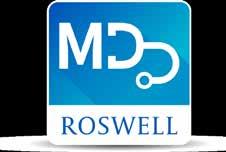
4 minute read
Coping with Covid-19: Recharging Your Resilience with Lifestyle Medicine
Coping with Covid-19:
Recharging Your Resilience with Lifestyle Medicine
Advertisement
Kerry Graff, MD
It has now been an entire year since Covid-19 upended our personal and professional lives. We, in health care, are more than willing to work long and hard when the need arises. The severity and longevity of the Covid-19 pandemic, however, along with the risk it poses to ourselves, loved ones, and colleagues, makes this unlike any other crisis health care workers have faced. The selflessness that is usually our superpower has become our kryptonite as we continue to work until we reach exhaustion, burnout, and illness. Many of us are frantically grasping for ways to escape this pandemic misery. We are zoning out--in front of the TV, by surfing the internet, or by scrolling endlessly through social media. We are imbibing more alcohol and turning to other substances for solace. We are eating more junk food, either because we are too busy to prepare something healthy or to “reward” ourselves for all our hard work. None of these maladaptive coping techniques gives us what we actually need—more resilience.
Resilience is the ability to recover quickly from difficult or changing situations. Unlike a muscle, resilience isn’t strengthened the more we use it. In fact, the opposite occurs. Just like the battery charge on a cell phone, resilience gets depleted as it is used. There is little we can do to decrease the drain of the pandemic on our personal resilience battery, but we do have a lot of ability to recharge it if we pick the right activities! Here are a few suggestions from lifestyle medicine to help you do just that:
1) Commit to 8 hours in bed every night. When you sacrifice your sleep, executive functioning, ability to handle challenges, and immune system are all negatively impacted. All of these need to be at their best right now!
2) Avoid electronics in the first hour of the day.
When you check your email or the news at the beginning of the day, you have let someone else decide what you are going to be thinking about or doing that day and you lose even more control over your already chaotic life. Instead:
3) Start your day focused on how you want to be rather than what you are going to do.
No matter how busy you are, remember that you are fundamentally a human being, not a human doing. Spend a few minutes at the start of each day in prayer, meditation, just sitting quietly with a cup of tea or coffee or any other activity that reminds you who you are when you aren’t doing anything!
4) Do something physical every day, outside if pos-
sible. Your body is flooded with stress hormones all day, and you will feel and sleep better if you burn them off by moving your body. Physical activity is the most underused stress reducer. And doing so outside in a natural environment will give you an additional mood lift!
5) Eat nutritiously. Avoid processed foods and include in your diet lots of fruits, vegetables, whole grains, beans, potatoes, along with some nuts and seeds. Eating this way has been proven to improve mood and immune function while also protecting you from developing chronic lifestyle-related diseases. If you don’t have time to cook, consider having healthy meals delivered.
6) Avoid toxic substances. The more you need a drink, the more you really need to avoid having one! Instead, go for a walk, love up your dog, talk to your spouse or a friend, cook some minestrone soup, or do a guided meditation when you feel stressed. Pick an activity that doesn’t just distract you from your distress but instead helps you recover your resilience.
7) Limit mindless TV/internet/social media time to no more than 1 hour a day and avoid it completely in
the hour before bedtime. These distracting but nonrestorative activities waste the little time you have available to recharge your resilience battery. In addition, the blue light stimulation from electronic devices along with the mental stimulation and emotional upset that often
goes along with what you are viewing can interfere with sleep. Pick calming activities before bed and keep the lights low.
Lifestyle medicine isn’t rocket science, but if you apply the above techniques, expect a cosmic shift in your resilience!
Kerry Graff, MD is a family and lifestyle medicine physician at Rochester Regional Health with her main office in Canandaigua, NY. Lifestyle medicine is a new medical specialty that uses evidenced-based techniques to prevent, treat, and often reverse lifestyle-related diseases like obesity, diabetes, heart disease, and autoimmune disorders.
Gratitude Review
Humans focus 3x more on threats than on
blessings. This trait is actually in our DNA because it helped our worried ancestors survive long enough to pass it on to us! But it is also true that we can’t hold onto anxiety and gratitude at the same time, and that by thinking of all the things we are grateful for, we can lessen our anxiety dramatically. The next time you feel anxious, try a gratitude review and see for yourself!

5REASONS TO JOIN GBUACO
1
Reduce Costs & Increase Savings
2 3
Strategic Partnerships with Other Providers
Increase Retention & Acquisition of Patients
4 5
More Control Over Patient’s Care
Access to More Advanced Technologies
Phone: (716) 247-5282 GBUACO Main Office: 564 Niagara Street, Building 2 Buffalo, NY 14201









